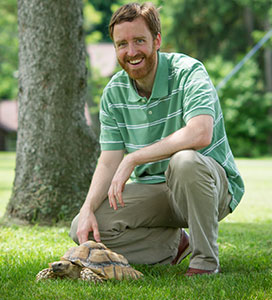Q & A with Charles Danko

Baker Institute faculty member, Dr. Charles Danko, sat down to talk about his background, his science, and one of the unexpected places he's been in the world (hint: it's in Asia AND in Europe).
Q: Where did you grow up? And where did you go to college and grad school?
A: I grew up around Washington DC, about an hour outside the city in a rural and lovely area across the river from Mt Vernon. I went to college at Johns Hopkins University and I went to grad school at SUNY Upstate. They mostly train MDs at SUNY Upstate, but there’s a small graduate program I attended.
Q: When people who are not scientists ask about what you study, what do you tell them?
A: I usually say I study genetics, but if they probe further I point out that only one percent of the genome encodes proteins. So a really fundamental question in this area is what the rest of the genome does. These are questions scientists are just starting to wrap their heads round.
What I’m particularly interested in is the fraction of the genome turns genes on and off. These are called regulatory regions and they allow the specialization of a whole bunch of different cell types. These regulatory regions allow neurons (nerve cells) to take on a very different form and function from cardiac myocytes, for example, using a single DNA sequence.
Q: And what’s the more technical answer?
A: I study how gene expression patterns are encoded in DNA sequences, how they contribute to normal organism function, and how they encode disease in many cases as well.
One of the projects I’d really like to do is collect tissues from a lot of different breast cancers and interrogate genome function. For the past 30 years or so, scientists could only look at one gene at a time. The technologies that I work with allow us to look at the 20,000 or so protein-coding genes and many 10s of thousands of noncoding RNAs, regulatory regions, and other types of functional units as well, all using a single experiment. It’s really powerful.
I’m also very interested in using the adaptive immune system as a model of cell differentiation and how cell differentiation works.
I’m excited to learn how these regulatory regions might contribute to evolution as well. The T cell system is also attractive for that because these cells can be obtained from blood samples, and because the immune system is evolving extremely rapidly.
Q: What attracted you to this field?
A: We’ve sequenced the complete genomes of a number of organisms, but we have no ideas what the vast majority of the genome does, or whether it has any function at all.
There are also a lot of applications for this field of study. People are finding that 90% of inherited diseases in humans are defects in the process of gene regulation. One of the basic problems in a variety of fields right now is understanding how this process works. A better understanding might allow treatments to be tailored to correct specific defects in gene regulation. This kind of treatment would be preferable to many of the current pharmacologic agents for these diseases, which are less specific and kind of like trying to go after a fly with a hammer, so to speak.
Q: What is most challenging for you about the kind of research you undertake?
A: Probably math. I don’t have a lot of formal training in math but I use a lot of it. When I have a specific question I go back to the literature and read about what types of approaches other people have used before.
Q: What does a successful career look like to you?
A: I’m really passionate about science, so I want to be doing exactly this for the rest of my career. I’m so excited the Institute would trust me with the startup funds to do it, and it’s such a beautiful place.
Q: How do you get to work every day?
A: I drive. I know it’s very non-Ithacan. I’m close enough to jog, so I should probably jog here every day.
Q: What’s your favorite place in Ithaca?
A: I think lately it’s been Treman Falls State Park. I like the upper gorge trail. I think it’s the most spectacular walk in Ithaca.
Q: What’s something about you that most people don’t know?
A: I really like to travel. I spent most of my grad career and some of my postdoc travelling. As an undergrad I went to Europe and spent summers backpacking around.
One of the coolest places I’ve been is Turkey. Istanbul is an extraordinary city. About 15 years ago, my wife and I and her brother and sister drove around the southern part of Turkey on the Asian side, right where Turkey meets the Greek Islands.


